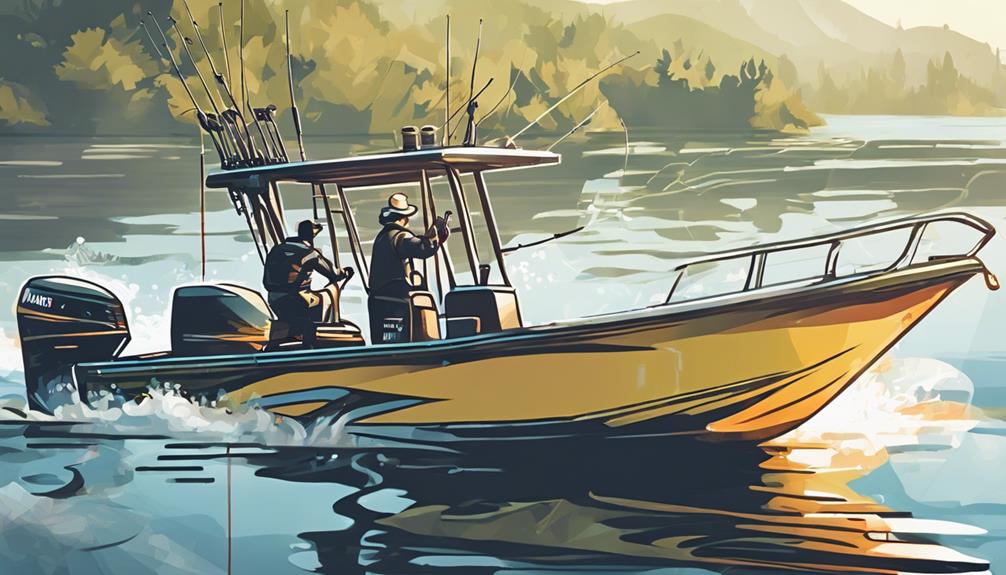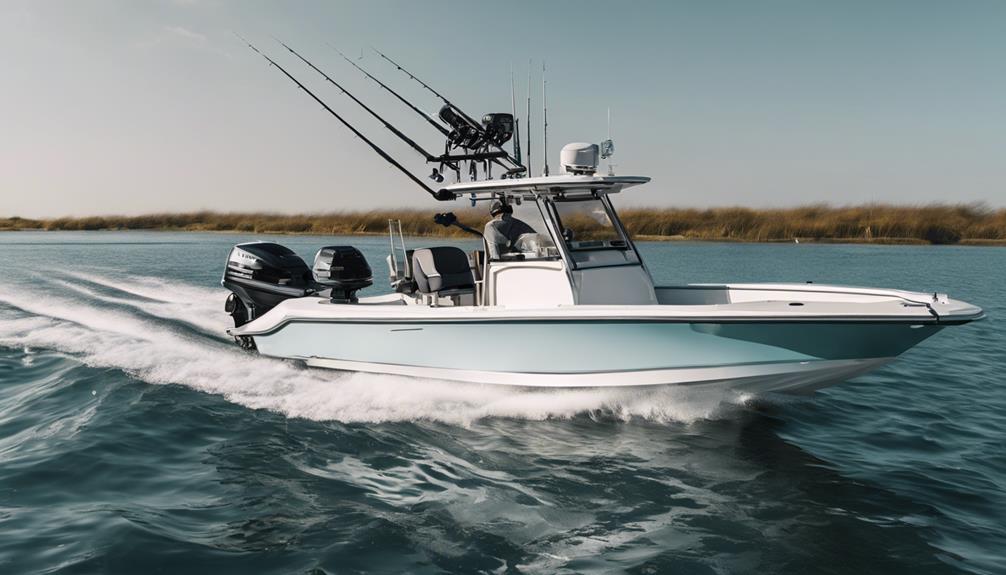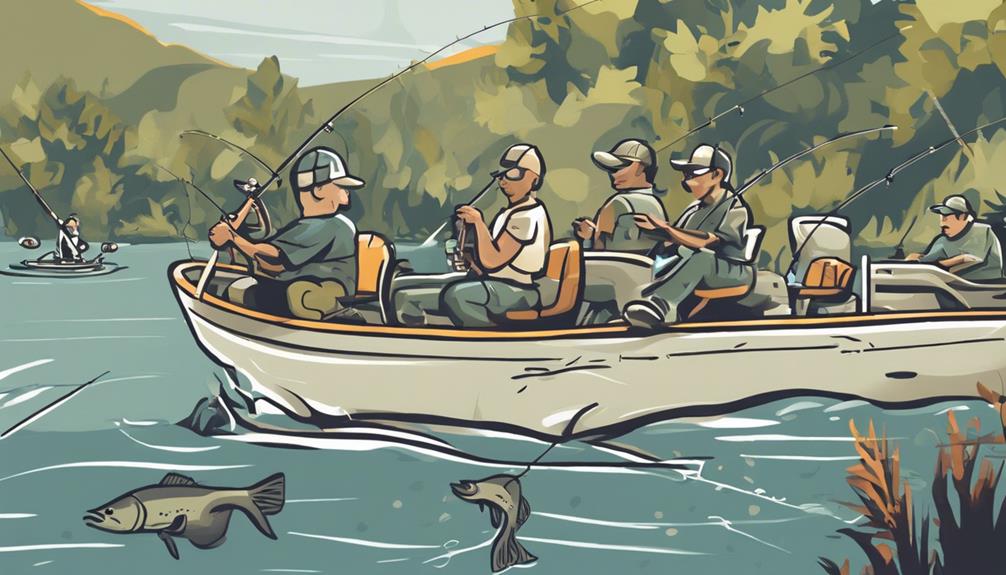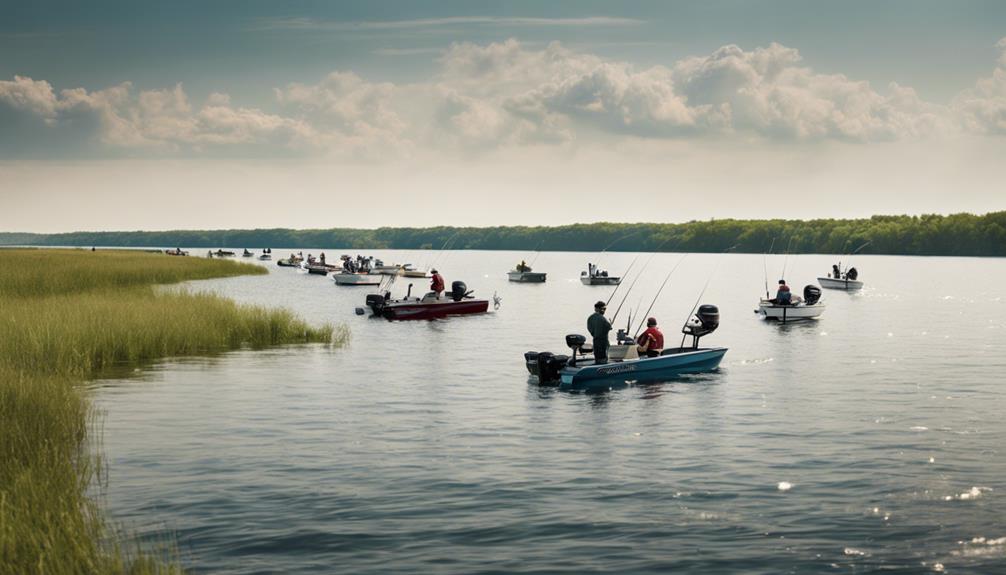Specific boat requirements are essential for fishing tournaments. They ensure safety compliance, emergency readiness, and fair play. By equipping boats with necessary safety gear, conducting regular maintenance checks, and verifying participant eligibility, the tournaments prioritize safety. Standardized equipment regulations prevent unfair advantages, promote ethical practices, and uphold competition integrity. Enforcing specific equipment guidelines, focusing on gear maintenance, and emphasizing safety protocols create a level playing field for all participants. These requirements also contribute to environmental conservation, sustainability, and efficient tournament procedures. Understanding the necessity of these regulations is key to successful participation in fishing tournaments.
Safety Regulations for Boats
Ensure your boat meets all safety regulations stipulated for fishing tournaments to guarantee a secure and compliant vessel. Emergency preparedness is crucial for any fishing tournament. Make sure your boat is equipped with all necessary safety equipment, such as life jackets, fire extinguishers, distress signals, and a first aid kit. Regular boat maintenance is essential to prevent malfunctions that could jeopardize your safety during the tournament. Check the engine, hull, electrical systems, and navigation lights to ensure everything is in proper working order.
Participant eligibility is often contingent upon meeting specific safety requirements for your boat. Before entering a fishing tournament, verify that your vessel complies with all safety regulations outlined by the tournament organizers. Additionally, having adequate insurance coverage is vital to protect yourself and your boat in case of any unforeseen accidents or damages during the competition. Check that your insurance policy includes coverage for fishing tournaments to avoid any potential financial risks.
Fairness in Competition
To maintain a level playing field in fishing tournaments, adherence to strict guidelines regarding equipment, techniques, and conduct is essential. When considering fairness in competition, it's crucial to ensure equity in participation and uphold sportsmanship in fishing. Here are key reasons why specific requirements are necessary:
- Preventing Unfair Advantages: Standardized equipment regulations prevent participants from gaining an unfair edge through specialized or advanced gear, ensuring that success is determined by skill rather than equipment.
- Promoting Ethical Practices: Upholding conduct guidelines fosters an environment of sportsmanship in fishing, where participants compete fairly, respecting both the rules and fellow competitors.
- Enhancing Competition Equality: By setting clear guidelines for techniques, all participants start on an equal footing, promoting equity in participation and enabling the best angler to win based on skill and strategy.
- Preserving the Integrity of the Sport: Strict adherence to regulations ensures that fishing tournaments maintain their integrity and reputation, upholding the values of fairness and honesty in competitive angling.
Ensuring Proper Equipment
Maintaining fairness and equality in fishing tournaments involves ensuring that all participants adhere to specific guidelines regarding the equipment they use, particularly focusing on proper gear requirements. Equipment maintenance is crucial to guaranteeing a level playing field. Well-maintained gear ensures that all competitors have the same opportunities to succeed based on their skills rather than the condition of their equipment. Safety protocols are another essential aspect of ensuring proper equipment. By enforcing safety measures, tournament organizers can protect participants from harm and create a secure environment for everyone involved.
Skill development is also influenced by the equipment used in fishing tournaments. When all competitors have access to the same quality gear, it levels the playing field and emphasizes the importance of honing one's abilities. This equal footing encourages participants to focus on improving their skills rather than seeking a competitive advantage through equipment discrepancies. Ensuring that all anglers have similar gear promotes fair competition and allows individuals to showcase their fishing expertise without being overshadowed by disparities in equipment quality.
Environmental Conservation Measures
Implementing effective environmental conservation measures is crucial for the sustainability of fishing tournaments and the preservation of aquatic ecosystems. To ensure the protection of the marine ecosystem and promote sustainable practices, the following measures are essential:
- Catch and Release Programs: Encouraging participants to release non-target or undersized fish helps maintain fish populations and biodiversity in the marine ecosystem. This practice reduces overfishing and minimizes the impact on fish stocks.
- Prohibition of Harmful Gear: Banning the use of destructive fishing gear such as gillnets or dynamite fishing is vital to prevent habitat destruction and protect vulnerable marine species. Sustainable fishing methods like rod and reel fishing or spearfishing should be promoted instead.
- Waste Management Strategies: Implementing proper waste disposal systems on boats and at tournament sites is crucial to prevent marine pollution. Ensuring that all waste, including plastics and fishing lines, is properly disposed of or recycled can significantly reduce the negative impact on the marine environment.
- Educational Programs: Providing educational materials and workshops on environmental conservation during fishing tournaments can raise awareness among participants. Understanding the importance of preserving the marine ecosystem and adopting sustainable practices is key to ensuring the long-term viability of fishing tournaments.
Standardizing Tournament Procedures
Effective management and coordination of tournament procedures are fundamental for ensuring consistency and fairness in fishing competitions. Standardizing tournament procedures plays a crucial role in achieving this goal. By establishing uniform guidelines for registration, weigh-ins, scoring, and other essential aspects of the competition, organizers can streamline processes, reduce confusion, and promote a level playing field for all participants.
Standardizing tournament procedures not only enhances the experience for competitors but also contributes to increasing participation rates. When anglers know what to expect in terms of rules and procedures, they're more likely to feel confident in registering for the event. Clear and consistent guidelines eliminate ambiguity and create a sense of trust in the competition's integrity.
Moreover, standardization facilitates the efficient management of fishing tournaments. Organizers can plan and execute events more effectively when procedures are well-defined and consistent across different competitions. This consistency also benefits officials and staff involved in running the tournament, as they can execute their roles more smoothly with standardized processes in place.
Enhancing Spectator Experience
To enhance the spectator experience at fishing tournaments, consider incorporating interactive displays showcasing real-time updates on catch statistics and angler performances. By providing engaging entertainment and improving visibility, spectators can feel more connected to the competition. Here are several ways to achieve this:
- Live Leaderboards: Implement large screens displaying live leaderboards showing the current rankings of participating anglers. This real-time information allows spectators to track the progress of their favorite competitors and adds an element of suspense to the event.
- Underwater Cameras: Install underwater cameras on the boats to capture footage of the action beneath the surface. Displaying this footage on screens near the shore can give spectators a unique perspective of the fishing techniques used by the anglers.
- Interactive Zones: Create interactive zones where spectators can simulate fishing challenges or learn about different fish species. This hands-on approach can educate the audience while keeping them entertained between catches.
- Commentary Stations: Set up commentary stations with knowledgeable hosts who provide insights into the strategies employed by the anglers. This added commentary can make the tournament more engaging for spectators, offering a deeper understanding of the competition dynamics.
Promoting Angler Skill

Enhancing angler skill in fishing tournaments requires a strategic focus on honing specialized techniques and leveraging cutting-edge equipment for optimal performance. Angler training plays a crucial role in preparing participants to excel in competitive fishing settings. Training programs often include instruction on casting accuracy, lure presentation, fish behavior analysis, and decision-making under pressure. By developing these skills, anglers can adapt to different tournament scenarios and increase their chances of success.
Competition strategy is another key component in promoting angler skill. Anglers must analyze factors such as weather conditions, water temperature, and fish movement patterns to determine the most effective approach. Utilizing technology like fish finders and GPS systems can aid in locating fish hotspots efficiently. Moreover, understanding the rules and regulations of each tournament is essential for developing a winning strategy. By staying informed and adaptable, anglers can make informed decisions that give them a competitive edge.
Upholding Tournament Integrity
Maintaining the integrity of fishing tournaments requires stringent adherence to rules and ethical standards by all participants. Ensuring fairness and preventing cheating are crucial aspects of upholding tournament integrity. To achieve this, the following measures must be implemented:
- Strict Enforcement: Enforce rules consistently and without bias to ensure a level playing field for all competitors. Any deviations or violations should be addressed promptly and fairly to maintain the integrity of the tournament.
- Technology Implementation: Utilize modern technologies such as GPS tracking systems and electronic monitoring to prevent cheating practices like entering prohibited areas or falsifying catch locations. These tools provide concrete data to verify participants' activities during the tournament.
- Random Inspections: Conduct random inspections of participants' equipment, catch, and documentation to deter cheating attempts. Random checks create uncertainty among participants, making it harder for individuals to engage in fraudulent activities without getting caught.
- Transparency and Communication: Foster open communication channels between organizers, participants, and officials to ensure transparency throughout the tournament. Clear communication of rules, expectations, and consequences for misconduct helps set the tone for ethical behavior and upholds the tournament's integrity.
Frequently Asked Questions
Are There Any Age Restrictions for Participants in Fishing Tournaments?
When it comes to fishing tournaments, age restrictions are a crucial part of participation rules. These restrictions ensure that participants meet certain criteria to compete fairly and safely.
How Are Tiebreakers Determined in Fishing Tournaments?
In fishing tournaments, tiebreakers are determined through a combination of factors. The weigh-in process plays a crucial role, where the accuracy of measurements is vital.
Additionally, the scoring system often considers length versus weight ratios to ensure fairness. In some cases, photo submissions may also be used as a tiebreaker method.
These methods help maintain integrity in the competition and ensure that winners are determined accurately.
Can Participants Use Drones or Underwater Cameras During Tournaments?
In fishing tournaments, participants can't use drones or underwater cameras due to strict regulations. This ensures fair play and prevents technological advantages. Equipment limitations and technology restrictions are in place to maintain the integrity of the competition.
Is Live Bait Allowed in All Fishing Tournament Categories?
In most fishing tournament categories, live bait isn't allowed due to regulations that prioritize fair competition and consistency. Artificial lures are typically the preferred choice to maintain a level playing field among participants.
Catch and release guidelines often emphasize the use of artificial lures to minimize harm to fish populations. These rules help ensure that tournaments are conducted ethically and in accordance with conservation practices.
Are There Any Restrictions on the Use of Electronic Fish Finders?
When it comes to fishing tournaments, there may be restrictions on the use of electronic fish finders. Sonar limitations are often in place to ensure fair play and maintain the competition rules.
Some tournaments may have GPS tracking regulations to uphold the integrity of the event. These measures are put in place to create a level playing field for all participants and to prevent any potential advantages that certain technology could provide.
Conclusion
In conclusion, specific boat requirements are necessary for fishing tournaments to ensure the safety of participants, maintain fairness in competition, and uphold the integrity of the event.
By standardizing procedures, promoting angler skill, and enhancing the overall experience for spectators, these regulations play a crucial role in the success and sustainability of fishing tournaments.
Additionally, they help protect the environment by ensuring proper equipment usage and conservation measures are in place.



